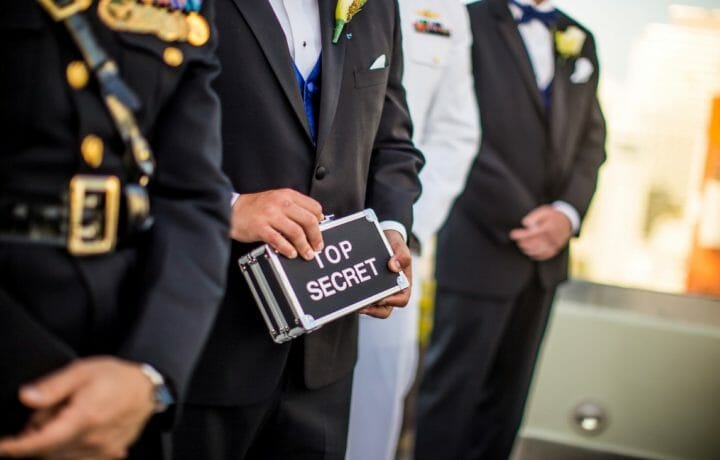| During Fiscal Year 2008 (Oct 07 to Sep 08) Defense Office of Hearings and Appeals (DOHA) Administrative Judges decided about 1,300 security clearance cases. These were cases where applicants received and responded to a “Statement of Reasons (SOR)” that specified why DOHA felt that the applicant should not be granted a clearance.DOHA posts clearance decisions at their website where it is possible to skim over a synopsis of each case or read full-length individual case decisions. |
The information presented here is based on suitability/security issues listed in the case synopses and should also be the same as the issues listed in the SORs for these cases. These are the top reasons for security clearance denial in 2008.
The Adjudicative Guidelines for Determining Eligibility for Access to Classified Information defines 13 issues that can be listed in an SOR. Twelve of the 13 issues are listed below according to the frequency they appeared in the case synopses followed by the total number of times they were listed. One issue, Allegiance to the United States, was not cited in any of the cases.*
| 1. Financial Considerations (681) | 7. Alcohol Consumption (108) |
| 2. Personal Conduct (497) | 8. Sexual Behavior (17) |
| 3. Foreign Preference (272) | 9. Use of Info Technology Systems (14) |
| 4. Criminal Conduct (252) | 10. Handling Protected Information (11) |
| 5. Foreign Influence (155) | 11. Outside Activities (5) |
| 6. Drug Involvement (134) | 12. Psychological Conditions (3) |
The number of separate issues present in each case ranged from 1 to 4. For example 3 delinquent debts would all be covered under the one issue of Financial Considerations; whereas, 3 delinquent debts plus 2 petty theft convictions would result in 2 issues—Financial Considerations and Criminal Conduct.
Financial Considerations was by far the most prevalent issue and appeared in over 50% of the cases. Although Personal Conduct was the second most frequently cited issue and appeared in 38% of the cases; it was almost always cited due to falsification of information related to one of the other issues. Foreign Preference, cited in 21% of the cases, and Foreign Influence, cited in 12%, frequently appeared together. The vast majority of Foreign Preference issues were based on the possession of a foreign passport and dual-citizenship; whereas, Foreign Influence was usually based on close relationships with people living in high-risk countries. Criminal Conduct ranked fourth, but its ranking was slightly inflated by the arbitrary use of this issue to cover the criminal aspect of falsification, illegal drug use, and alcohol-related arrests already covered by the Personal Conduct, Drug Involvement, and Alcohol Consumption issues. Drug Involvement was cited in 10% of the cases and Alcohol Consumption was cited in 8%. The remaining issues were cited in 1% or less of the cases. About 63% of all these cases resulted in a clearance denial or revocation.
Historically the most prevalent suitability/security issues have been Criminal Conduct, Drug Involvement, Alcohol Consumption, and Financial Considerations. Personal Conduct has also been a leading issue, but as previously indicated, it is regularly cited when applicants list false information on their security forms regarding arrests, drugs, alcohol, or finances. Over the years the number of cases involving Financial Considerations has gone up or down in response to changes in the economy, particularly unemployment. In FY98 it was only the 5th most prevalent issue.
In the past 10 years the number of clearance investigations processed at the Defense Industrial Security Clearance Office has increased about 50%, but the number of cases with significant derogatory information has increased by more than 500%. In FY98 DOHA had about 250 cases resulting in SORs, compared to about 1300 in FY08. Some of this is attributable to the dramatic increase in the number cases citing Foreign Preference and Foreign Influence as issues. In FY98 these issues were cited in DOHA cases a total of 15 times, compared to a total of 427 times in FY08.
Suitability/security issue distribution in DOHA cases differs significantly from cases at other major Department of Defense (DoD) Central Adjudication Facilities (CAF). Eighty-one percent of the clearances denied or revoked by the Department of Navy CAF in FY08 were due to Financial Considerations. The number of Foreign Preference and Foreign Influence issues in DOHA cases is currently greater than at other major DoD CAFs.
* Allegiance to the United States has rarely been an issue in security clearance adjudications, because background investigations that develop credible information concerning this issue are almost always closed before completion and transferred to a federal criminal investigative agency.
Copyright © 2008 Last Post Publishing. All rights reserved. William H. Henderson is a retired security investigator, author of Security Clearance Manual, and regular contributor to ClearanceJobsBlog.com and ClearanceJobs.com.


